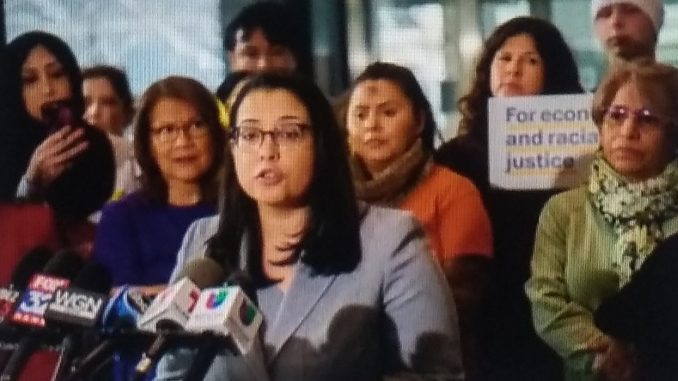
President Donald Trump’s “public charge” rule — which could penalize immigrants who seek public benefits — faced a bombardment of critical questions Wednesday from federal appeals judges hearing Cook County’s legal challenge to the change.
Just days after the U.S. Supreme Court allowed the rule change to go into effect, three judges on the Seventh Circuit Court of Appeals in Chicago, including one who participated by video, grilled Gerard Sinzdak, the attorney representing the U.S. Department of Homeland Security, on the definition of public charge. U.S. Appellate Chief Judge Diane Wood pressed for evidence to support changes in the rule, saying some of it seemed to be plucked “out of thin air” and not from data on immigrants.
Federal immigration authorities started implementing the rule Monday after the Supreme Court reversed an injunction issued in Cook County’s legal challenge, though Justice Sonia Sotomayor wrote a sharp dissent. But the legal challenges continue, and Wednesday’s arguments will determine if the appellate court will rule against the change.
“Public charge” refers to immigrants who are primarily dependent on some form of public assistance, which advocates of the rule-tightening say puts an undue and unfair burden on limited tax resources. The new rule broadens that definition, meaning the agency could deny the application of someone who entered the country legally and is seeking permanent residency. It also applies to those seeking to apply or extend a visa.
Under the rule, people could have their applications rejected if they used or are likely to use programs such as Supplemental Security Income, Temporary Assistance for Needy Families, Supplemental Nutrition Assistance Program, some forms of Medicaid and certain housing programs.
Officials also weigh other factors when reviewing visa or green card applications, such as a person’s age, health, family status, overall assets, employment and their ability to speak English. Certain immigrants will be exempt from the rule, such as refugees, asylees and certain crime victims.
Immigrants would not be penalized for using programs including disaster relief, national school lunch, Head Start, and subsidized student and mortgage loans.
On Wednesday, the judges posed several scenarios, trying to gauge how soon the government would deem an immigrant a public charge. According to U.S. Citizenship and Immigration Services, a person would be a public charge if they received benefits for more than 12 months in a 36-month period.
But under questioning from the judges, Sinzdak said it was possible for someone to be deemed a public charge if they received multiple benefits in less than 12 months. He pointed out that Homeland Security narrowed down the benefits to food, housing and medical care.
Wood also brought up the threat of the coronavirus, questioning if the rule might stop an immigrant from seeking medical attention out of fear, thus costing the government more money if the virus spreads.
Another question raised was why the government didn’t instead seek reimbursement from people sponsoring immigrants who used public benefits. Sinzdak said that while the government can seek that form of reimbursement, it is costly and time consuming.
David Morrison, an attorney representing Cook County, said the county could end up with higher medical costs and lower federal reimbursements if fewer immigrant patients apply for Medicaid out of fear.
He also argued the rule has a chilling effect similar to when Trump’s administration sought to place a citizenship question on the 2020 census. Morrison said the rule will cause people to choose between health care and their immigration status.
The court of appeals is expected to issue a ruling within a few weeks. Militza Pagán, an attorney with the Shriver Center on Poverty Law who is working with Cook County and the Illinois Coalition for Immigrant and Refugee Rights on the legal challenge, said if the court rules in favor of their original injunction, they expect the government could seek review from the U.S. Supreme Court.
The rule was initially supposed to go into effect Oct. 15, but it was entangled in challenges, including Cook County’s. In January, the U.S. Supreme Court reversed a ruling out of New York that placed a nationwide hold on the rule. For the time, the government could not implement the rule in Illinois. Then last week, the U.S. Supreme Court reversed the injunction in Illinois.
The arguments heard Wednesday stem from the lawsuit filed in September by Cook County and the immigration coalition challenging the public charge rule. In the original complaint, county officials argued the public charge rule would have a chilling effect in immigrant communities, leading to more families not enrolling in health programs and instead placing a great financial burden on county agencies.
Friday’s decision by the high court to reverse the Illinois injunction meant at least one Chicago-based law firm spent the weekend scrambling to submit applications before Monday’s implementation of the rule. Kathleen Vannucci, a Chicago-based immigration attorney, said that in about 24 hours, her law firm finished 43 applications to ensure they were postmarked Sunday. The Supreme Court reversal happened Friday night, but USCIS didn’t allow a grace period for Illinois, she said.
“These were individuals that absolutely would have had a very difficult time getting approved with the new public charge rule,” Vannucci said. “It was life or death for these clients.”
Inhe Choi, the executive director of the Chicago-based HANA Center, said while the rule went into effect Monday, they’ve heard of immigrants opting out of public benefits for over a year out of fear of what it could mean to their case. In one case, a naturalized citizen was still scared of enrolling her child in the program.
*Story by Chicago Tribune